
5 minute read
Trends and Developments
Contributed by: Markus Fellner, Paul Luiki and Peter Blaschke Fellner Wratzfeld & Partners
Fellner Wratzfeld & Partners (fwp) is one of Austria’s leading business law firms, offering with its 70 lawyers full legal services to its clients. The firm’s clients include leading banks and other financial institutions, privately and publicly owned companies, industrial manufacturers and public sector authorities. The firm’s expertise covers the full spectrum of industry sectors. fwp’s approach to providing legal services places particular emphasis on combining
Authors
Markus Fellner is a founding partner at Fellner Wratzfeld & Partners and advises on highprofile corporate and M&A transactions, banking and finance law, as well as on complex corporate restructurings/insolvencies. He was admitted to the Austrian Bar in 1998 and lectures at various institutions. Markus Fellner is well-known for his outstanding track record advising often banking clients and leading companies on major acquisitions. Markus Fellner continues to advise the Steinhoff Group on all corporate matters. Another key highlight is advising UniCredit Bank Austria in connection with the enforcement of its minority rights resulting from UniCredit Bank Austria’s position as shareholder of the institutions forming the 3Banken Gruppe (3-banks group), which is the most prominent corporate litigation in Austria.
in-depth legal expertise and well-founded business knowledge with an entrepreneurial focus to meet client needs. In addition to their legal expertise, the firm’s lawyers have either supplementary degrees in economics, complementary professional experience or have studied or worked abroad. fwp has an established international practice and handles on an on-going basis major cross-border matters.
Paul Luiki is a US native partner at Fellner Wratzfeld & Partners specialising in the full range of M&A transactions. He has a specific focus on cross-border transactions, in particular in the CEE and US regions. His other fields of specialisation are contract law and dispute resolution involving corporate matters. Paul Luiki is also a frequent lecturer at the University of Vienna on M&A and joint ventures.
Peter Blaschke is an attorney at law at Fellner Wratzfeld & Partner specialising in corporate and M&A and dispute resolution. He obtained a law degree from the University of Vienna and was admitted to the Austrian Bar in January 2003.



Fellner Wratzfeld & Partner
Schottenring 12
1010 Vienna Austria
Tel: +43 1 537 70 – 351
Fax: +43 1 537 70 – 70
Email: marketing@fwp.at
Web: www.fwp.at
Overview of the Austrian M&A Market
The massive 2021 boom did not extend into 2022 due to an uncertain geopolitical and economic environment, which is reflected in particular in rising energy prices, inflation and interest rates. Notwithstanding this development, the worldwide M&A market continues to be driven primarily by active private equity investors and a large number of special purpose acquisition companies (SPACs), ie, shell companies that raise money via an IPO and then invest in unlisted companies. These market drivers on the global stage still play a subordinate role in Austrian transactions.
Despite the challenging market conditions, the M&A market in Austria remains stable regarding the number of deals concluded. The number of deals with Austrian involvement actually further increased from 293 M&A transactions in 2021 to 297 M&A transactions in 2022; this corresponds to an increase of 1.4% in M&A transactions according to the M&A Index 2022 published by EY Austria (Ernst & Young Global Limited). However, the number still is below the 2019 pre-COVID-19 level.
The number of reported transaction volumes declined sharply, partly because far fewer parties published their transaction volumes. Thus, the total reported transaction volume significantly decreased from EUR9.1 billion to EUR2.3 billion, which is below the long-term deal volume average. A majority of the deal volume was made up by five top deals, representing 70% of the total transaction volume. The remaining 30% was divided primarily among 24 other M&A deals.
CPI Property Group S.A.’s purchase of 12.7% of IMMOFINANZ AG for around the equivalent of EUR403.5 million accounted for the biggest single deal in 2022.
Strategic investors
Strategic investors are still involved in the vast majority of transactions in the Austrian M&A market: 286 out of the 297 transactions in 2022 involved strategic investors, corresponding to an increase of ten deals compared to 2021. On the other hand, transactions involving financial investors, such as private equity or venture capital firms, still play a minor role in Austria’s M&A market. With only ten deals (3.4% of total transactions) compared to 17 deals in 2021, there is a slight decline in investors looking for strategic acquisition targets or divesting parts of their business to realign their portfolios.
Contributed by: Markus Fellner, Paul Luiki and Peter Blaschke, Fellner Wratzfeld & Partners
Sector dominance in the last year
Regarding the number of reported transactions, most deals took place in the industrial sector (89 deals), followed by the real estate sector (68 deals) and companies from the technology sector (60 deals).
In terms of published transaction volumes, the real estate sector clearly took the lead with EUR1.5 billion, which is the result of the purchase of the Austrian-based company IMMOFINANZ AG by CPI Property Group S.A. The industrial sector took the second place with a total transaction volume of EUR500 million.
Regarding foreign M&A transactions, the number of acquisitions of foreign companies by Austrian companies that pursued their international growth targets (“outbound”) strongly increased in 2022 to 133 from 104 deals the year prior – an increase by 27.9%. With a decrease of 13.5% in the “inbound” segment (the number of transactions fell by 18 deals) foreign investors still continued to be active in Austria in 2022. The largest foreign players on the Austrian M&A market are clearly German investors who conducted a total of 36 inbound transactions – corresponding to 31.3% of all inbound purchases of Austrian companies. Likewise, 27.8% of all outbound transactions concerned German targets.
Recent Legal Changes Digitising notarisation
Since 1 January 2021, all notarial acts and other public or publicly certified deeds can be drawn up by use of electronic means of communication without the need for physical presence before the notary public. This was the result of the Austrian legislature implementing the new Section 90a into the Notarial Regulation (NO). Electronic notarisation – like physical notarisation – can also be performed in a multilingual form and is thus especially relevant for parties located abroad, since this brings a substantial benefit with regard to avoiding travel expenditures and time delays. The official notarial acts that are required under Austrian corporate law for most transactions were clearly simplified and accelerated.
Cartel Act going “green”
With the Cartel and Competition Law Amendment Act 2021, the Austrian legislature has not only implemented EU legal requirements (Directive (EU) 2019/1), but above all adapted cartel law to more recent developments in economic life. The amendment takes particular account of the digital platform economy and climate change. The most important changes in practice are in merger control.
The new version of Section 2 paragraph 1 of the Austrian Cartel Act expands the few legal exceptions to the ban on cartels: cartels are now also exempted if their profits contribute significantly to an ecologically sustainable or climate-neutral economy. The provision thus creates legal certainty and a free space for entrepreneurial cooperation in favour of sustainable agreements that would otherwise be prohibited under national law.
As regards merger control, the new version of Section 9 paragraph 1 no 2 of the Austrian Cartel Act amends the previous provision requiring notification of any merger with a total domestic turnover of more than EUR30 million in the last business year to the effect that at least two of the companies involved must also have generated domestic turnover of more than EUR1 million each.


